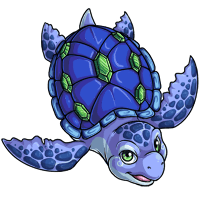


Chelon
(CHELL-on)
Chelons have long since been found throughout the warm, salty ocean waters of Subeta. The discovery of Shengui Guo, however, also lead to the discovery of the true origins of this large and peaceful reptile. Not only do chelons thrive throughout Shengui Guo, but they also use the beaches surrounding the mountains as their mating and nesting grounds - something that Subetan zoologists have long been mystified about.
Chelons are quite big and will grow throughout their long, quiet lives -- for they are known to live for well over one hundred years, some up to 150 or more. The average chelon is about 3-4 feet (.9-1.2 m) long, and males can weigh 350 lbs (159 kg). Females remain slightly smaller though they are still a considerable size. Although they are not truly pack animals, they often swim together in the same open waters, forming large groups known as a globe. A globe of chelons basking on the rocks around Shengui Guo has become a common sight since its discovery. Chelons prefer to remain in the water, taking to the shore only to mate, and later for the female to lay her eggs in the dark, clay-like sand. After several weeks, the eggs hatch and thousands of tiny baby chelon hatchlings make their way for the water, where they will begin the cycle anew.
Chelons are herbivores and will mainly eat kelp, seaweed, and other underwater greens, although they will unquestioningly digest a tiny fish found among the greenery. They are extremely gentle and curious, and will sometimes investigate swimmers and divers with their beaks and flippers. This sometimes ends up poorly for the chelon, as many people have become quite interested in the gems that form in their shells as they age. Usually, this collection of gems is handled much more humanely; when chelons die of natural causes, their bodies wash up on the shore, making the harvesting of these gems easy. They are considered quite beautiful, and they are used in many traditional Shengui Guo jewelry pieces.
Due to their need for large, open salt water pools, chelons do not always make ideal pets. They are sometimes kept casually by those that live on the ocean shores or beaches, but this tends to be more out of convenience for the chelon; they learn quickly that their adorable antics will end up in food being offered to them, and in return they will provide their new caretakers with years of companionship. Their scales are also quite useful - as they shed, ocean visitors can collect them along the beach. They are often turned into simple jewelry or decoration, and sometimes even ground into powder which has a variety of believed medical uses.
Chelon has been viewed 3,885 times.
[Search]